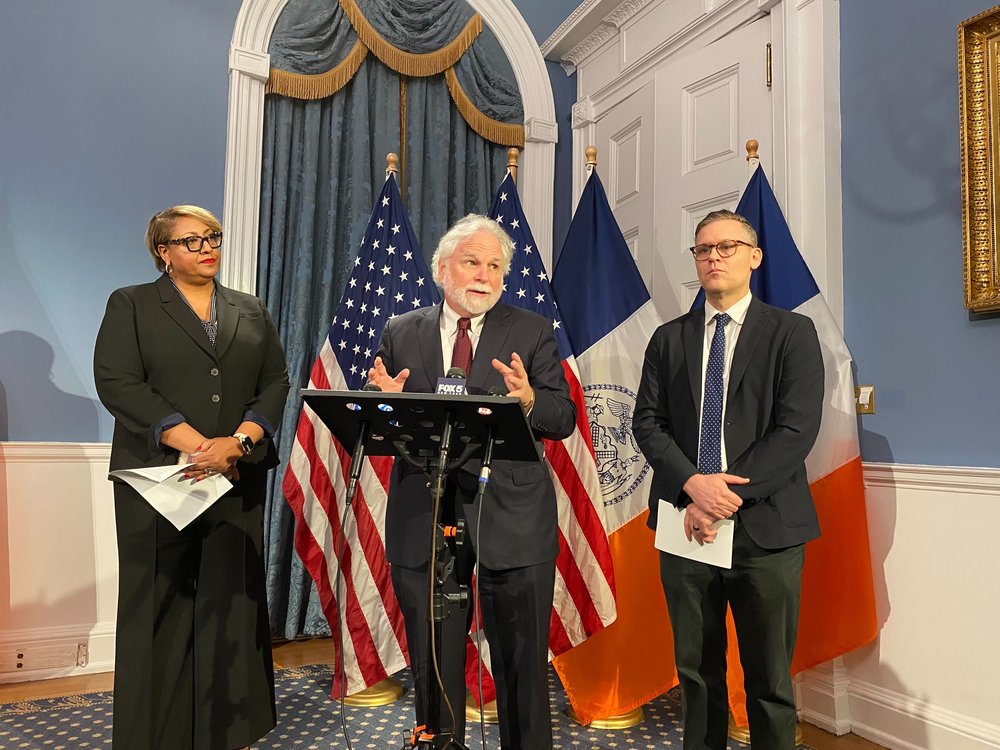NYC shuts down child care subsidy enrollment amid feud with Hochul
May 5, 2025, 12:24 p.m.
First Deputy Mayor Randy Mastro said new families who qualify for child care subsidies based on their income will be put on a wait list.

New York City on Monday will stop enrolling new families seeking child care vouchers, amid an escalating feud with the state over who should pay for the popular program that helps thousands of low-income New Yorkers.
First Deputy Mayor Randy Mastro said new families who qualify for child care subsidies based on their income will be put on a wait list.
“To be clear, this is a step we did not want to take,” Mastro told reporters Monday, blaming the state.
Gov. Kathy Hochul’s $254 billion budget deal announced last week includes an additional $350 million for New York City vouchers, but only if the city agrees to match those funds.
While state funding for vouchers has doubled in the last three years, the city’s share has remained largely flat and a small percentage of the voucher program’s overall budget.
“The status quo is unsustainable, and if we are serious about providing comprehensive, affordable child care for working families, then these costs must be a shared responsibility between the city and the state,” Hochul spokesperson Avery Cohen said.
She said the governor’s budget offered “a clear solution that would avoid any enrollment pause."
But Mastro said the state was trying to skirt its responsibility by shifting the bill to the city.
“You don’t change the rules in the middle of the game when families and children are at stake,” he said.
The Child Care Assistance Program provides an average of $300 a week to families who qualify based on income. But the program has exploded in popularity, and 750% more New York City families are enrolled now than in 2022. City officials say the state also made the program more expensive to operate by raising reimbursement rates for child care providers, which increased costs by 20%.
Enrollment has exceeded the program’s budget, and thousands more families are expected to qualify for the vouchers now that work requirements have returned for New Yorkers receiving cash assistance. City officials will have to give vouchers to families on cash assistance first, which could mean thousands of other families get kicked off their vouchers when the money runs dry.
Jess Dannhauser, commissioner for the Administration for Children’s Services, which runs the program for the city, said families on cash assistance who are trying to enroll would still be able to do so because the city is mandated to provide subsidized child care to them.
In a joint statement Monday, City Council Speaker Adrienne Adams and Council Finance Chair Justin Brannan said the wait list represented the "wrong approach."
“Just days after proclaiming to have the ‘best budget ever,’ Randy Mastro and the mayor seem willing to give up on New York City’s working families in the face of adversity,” they said. “With the state budget outstanding, there can be no excuses to provide the funding necessary to supporting the thousands of families whose access to childcare is at risk.”
For now, families with the voucher will be able to keep their benefits.
Child care advocates said more than a dozen other counties across the state have also been forced to close their enrollments and open wait lists.
Even if the state and city reach a compromise, the millions of dollars in proposed funding increases still would not be enough to cover the more than 70,000 families receiving the voucher and the thousands more expected to need subsidized care in the coming weeks. City officials have previously estimated 4,000 to 7,000 families could lose their vouchers every month without more money.
State lawmakers are expected to vote on the final budget this week.
NYC, state battle over child care funding for thousands of New Yorkers 7K NYC families could lose child care subsidies each month under state budget plan